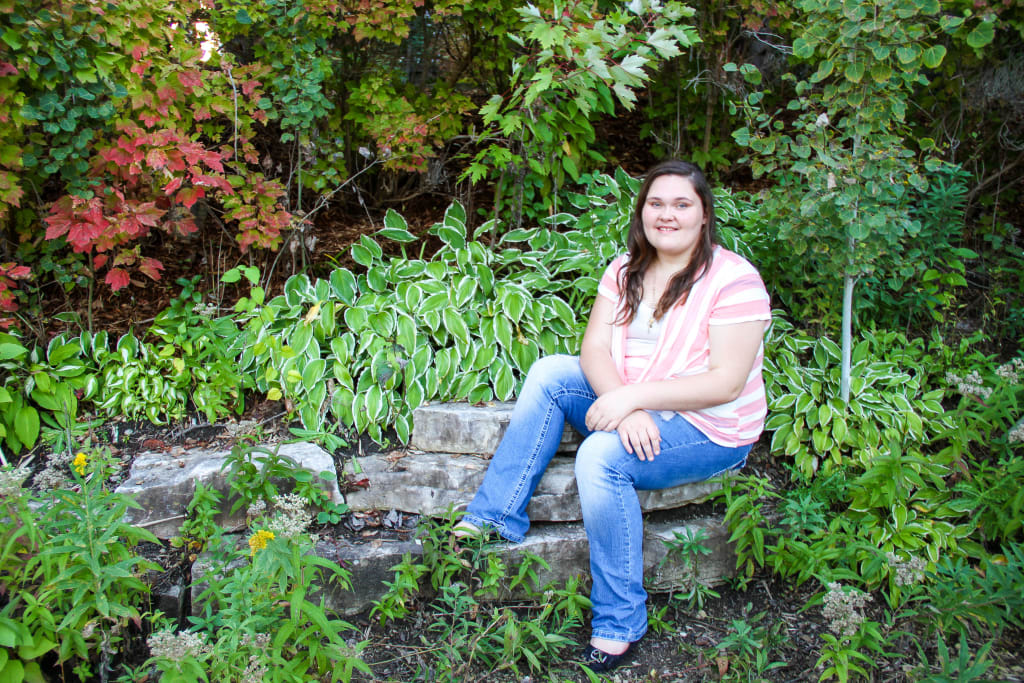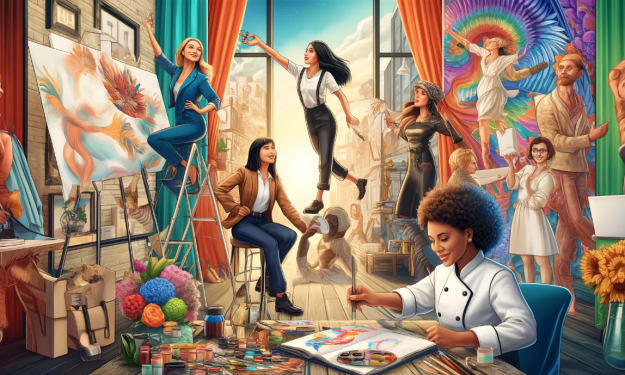The Rhetorical Analysis of Peggy Orenstein's 'Just Between You, Me, and My 622 Bffs'
I wrote this story my second semester in college. This story talks about the bullying that happens online, and what I have been through throughout the years.

When I first got into Facebook and Twitter, I got bullied because of my weight and looks. I would have people comment on my pictures "You're fat," "You are a cunt," "You need to lose weight," "It looks like your face got ran over a bus six times," and the worst one, "You're too ugly to be alive." This, of course, killed me inside. I stayed home for days at a time thinking to myself, "Am I really that ugly?" When I would go to school, I'd ignore everybody because I was afraid that they would start telling me all of those things to my face. But then I met my friend Adrianna in seventh grade. Adrianna always stuck up for me when people would start to call me names. Adrianna and my cousin Brittany were the two that made me feel good about myself. They made it so I wouldn't care what people would think, but then the bullying started to get worse. I went to my principal and tried talking to him about what was going on.
"What's going on, Bratsch? Is everything okay?" he asked me.
I looked at him while I was trying not to cry. I replied, "I have people harassing me and making fun of me because I am bigger, sir, and it will not stop! People will come to me and poke at me for no reason at all. When I tell them to stop, they give me dirty looks and tell me no!"
As I sat there and waited for a response, the principal looked at me as if I was joking or as if he was confused about the situation. He finally choked up and said, "Well, Miss Bratsch, there isn't really anything we can do besides talk to those students and get them to stop."
After hearing what he told me, I said nothing and walked out without even saying, "Bye." While walking back to class, I saw the students who always picked on me and I overheard them talking about other students as they were pointing and laughing at their phones. When I saw that, it made me think to myself, "So it isn't just me they are bullying?"
That night when I was at home, I thought it was time to start sticking up for myself and others that they were starting to bully. After I started to stick up for myself, I started to feel better about myself. I started to change my clothing and looks when I got into high school. I had the guys that bullied me always asking me for "dirty photos" after I changed up my looks. I didn't really want to send them any — not just because they made fun of me, but I felt really uncomfortable with that kind of stuff, and I also wasn't that type of girl to share my body with anyone else. After I would tell the guys that, they would tell me, "You know what? Never mind! You are too ugly and fat anyways." After dealing with guys trying to get dirty pictures or trying to sext with me, I realized that the internet is messed up and no matter what happens, no matter how many times you say no, people will always have something bad to say about you and try to make you feel bad.
After reading the essay by a journalist named Peggy Orenstein, "Between You, Me, And My 622 Bffs," I realized that this story and I have something in common. She talks about females and their life online, and the consequences of being online. Some people in this story that Orenstein writes about and interviews are Erin, Katie, Felicia, Jessica, Megan, and Alexis, and they all have stories that range from their popularity to name-calling to suicide, which is nothing to mess around with. This story takes place between the years of 2005 to 2011. And the reason why she decided to talk to high school kids is because they have more experience and stories to how social media has affected them and she is also disturbed on what she sees. One reason why Orenstein is disturbed is because she sees all of these high school girls sharing dirty pictures of themselves on the internet, and if you put something on the internet, it's on there forever.
Another thing that she sees online that disturbs her is the cyber bullying. Cyber bullying isn't anything to mess with. A lot of people take that stuff seriously, also. Some people end up in a mental hospital for the things that are said about them. Some people even end up committing suicide. According to research I did in high school, nearly 30 percent of students are either bullies or victims of bullying, and 160,000 kids stay home from school every day because of fear of bullying. There was also research stating that 4,400 people commit suicide a year because of cyber bullying. Towards the end of the story, Orenstein says, "Watching the unparalleled social experiment being conducted on our children, it's worth considering —for boys as well as girls — how Internet use enhances their real lives, their real friendships, their contributions to the real world. And if we can't answer all of that in a satisfying way, maybe it is time to give their second lives some second thought" (453). When seeing her say that, wouldn't it make you think twice if you want your children on social media or not?
Orenstein's New York Times best-sellers are Cinderella Ate My Daughter: Dispatches from the Front Lines of Girly-Girl Culture and Waiting for Daisy. According to the author's web page, Orenstein was recognized for her “Outstanding Coverage of Family Diversity,” by the Council on Contemporary Families and received a Books for a Better Life Award for Waiting for Daisy. In the past years, Orenstein also wrote Women on Sex, Work, Kids, Love and Life in a Half-Changed World and School Girls: Young Women, Self-Esteem and The Confidence Gap. In 2012, she was named by The Columbia Journalism Review as one of its "40 Women Who Changed the Media Business in the Past 40 Years." Orenstein was born in Minneapolis, Minnesota. Orenstein is also graduate of Oberlin College which is in Oberlin Ohio. Peggy now lives in the San Francisco Bay Area with her husband, filmmaker Steven Okazkai, who has received a Peabody Award and been nominated for four Academy Awards, and their daughter, Daisy.
In this essay, the immediate audience would be teachers, parents of high school students, guardians, and those who work with young people. The secondary audience is the people that are reading the essay in ReReading America, which are mostly college professors and college students. The reason why the editors put this into Rereading America is because the readings speak directly to the students' experiences and concerns. In all honesty, it fits perfectly because of today's student experiences on the social media. This book would be very good for college students like me to read also. The readings in ReReading America could help students get through life, and help them understand the people and world around them.
As Orenstein said, "In the early days of the Web, people feared their daughters would be stalked by strangers online, but the far bigger threat has turned out to come from neighbors, friends, and peers" (449). This quote should affect parents. When Orenstein says, "but the far bigger threat has turned out to come from neighbors, friends and peers" which is kind of unpleasant to think about. After reading it, wouldn't parents do their own kind of investigating to who their kids are talking to? Because now days, you never know if the person that you're talking to is real or not. What if you and that person have become "good friends" and you told them your deepest darkest secrets? They will probably end up telling others or blackmail you with it if you don't give them what they want. The quote above is connected to the rest of the text, because it is mostly about females and their life online. These females go through so much each day, between people making sexist comments, distorting their image of their own being, and having to worry about pedophiles that are leaking around online. When readers read this quote, I believe it should affect them in many ways. It should make you think twice before you put certain things online. It should also make you think of who you decide to become friends with on the social media.
When I was done reading this essay, I found it to be very persuasive. In the middle of the story, Orenstein says, "Apparently, teenagers are not the only ones at risk of turning the self into a performance, though since their identities are less formed, one assumes the potential impact will be more profound." I found this quote to be very persuasive. Orenstein is trying to make you understand that everything that has been happening to teenagers, could also happen to you no matter what age. The way Orenstein talks about the high school girls in this essay, I found her tone to be concerned. Orenstein says, "A full two-thirds of today's young adults rank above average; excessive self-involvement is associated with difficulty in maintaining romantic relationships, dishonesty and lack of empathy" (447). Without empathy, what do you have? You will just sit there taking in everything those bullies are saying to and about you. Orenstein is concerned about the future of these girls.
When doing my research on Orenstein, she has definitely been successful in achieving her purpose. Her books and articles are very interesting and also very helpful. The way Orenstein tells her essay, "Between You, Me and My 622 Bffs," definitely caught my eye. The thing that caught my eye was, that a lot of the things that were in the reading, have happened to me. I've been through bullies and I have been through the weirdos online. But after reading this, it proves that it happens to a lot more people than you would think. When parents and guardians read this story, maybe they will keep themselves and their children safe from problems online. A way high schools can deal with bullying and cyber bulling, is actually doing something about it. They need to give the bullies ISS or even suspend them! And if it keeps happening, get the police involved! No kid ever deserves to go through this. Kids should be able to go to school without being afraid of what will happen to them.






Comments
There are no comments for this story
Be the first to respond and start the conversation.